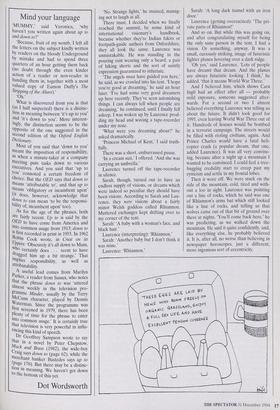Mind your language
`MUMMY,' said Veronica, 'why haven't you written again about up to and down to?'
`Because, fruit of my womb, I left all the letters on the subject kindly written by readers on the bloody Underground by mistake and had to spend three quarters of an hour getting them back (no doubt through the even kinder action of a reader or non-reader in handing them in, together with a most valued copy of Eamon Duffy's The Stripping of the Altars)! `Oh,' What is discovered from you is that (as I half suspected) there is a distinc- tion in meaning between 'it's up to you' and 'it's down to you'. More interest- ingly, the distinction seems to be the °Pposite of the one suggested in the second edition of the Oxford English Dictionary. Most of you said that 'down to you' meant the imposition of responsibility, as when a minute-taker at a company meeting puts tasks down to various executives. And you said that `up to You' connoted a certain freedom of choice. But the OED says that down to means 'attributable to', and that up to means 'obligatory or incumbent upon' (it does, however, acknowledge that down to can mean `to be the responsi- bility of, incumbent upon' too).
As for the age of the phrases, both are fairly recent. Up to is said by the OED to have come from America and into common usage from 1913; down to is first recorded in print in 1955. In 1962 Robin Cook wrote, in Crust on its Uppers: `Obscurely it's all down to Mum, who certainly does . . seem to have d ragged him up a bit strange.' That anPlies responsibility, as well as attributability. A useful lead comes from Marilyn Parker, a reader from Sussex, who notes that the phrase down to was 'uttered almost weekly in the television pro- gramme Minder, usually by the Terry McCann character, played by Dennis Waterman. Since the programme was first screened in 1979, there has been plenty of time for the phrase to enter Into common usage.' It is certainly true that television is very powerful in influ- encing this kind of speech. Dr Geoffrey Sampson wrote to say that in a novel by Peter Chepstow, Muck and Brass (1982), the wide-boy Craig says down to (page 62), while the merchant banker Bastedes says up to (page 176). But there may be a distinc- tion in meaning. We haven't got down to the bottom of this yet.
Dot Wordsworth


























































 Previous page
Previous page